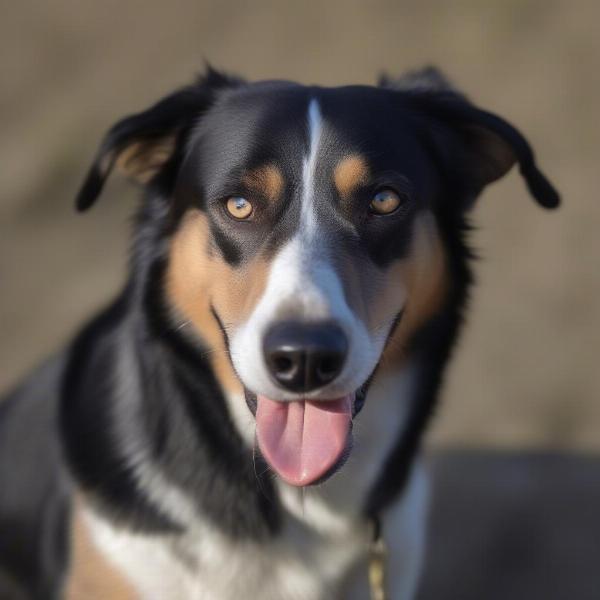Iodine is an essential mineral for dogs, playing a crucial role in thyroid hormone production. These hormones, thyroxine (T4) and triiodothyronine (T3), are vital for regulating metabolism, growth, and development. While iodine deficiency can lead to serious health issues, excessive iodine can be equally harmful. This article will explore the importance of iodine for dogs, the signs of deficiency and excess, safe supplementation, and answer frequently asked questions to ensure your canine companion receives the right amount of this essential nutrient.
Understanding the Importance of Iodine in Canine Health
Iodine’s primary function is in the thyroid gland, located in the neck. The thyroid uses iodine to produce T4 and T3, which influence nearly every organ system in the body. These hormones control metabolic rate, affecting energy levels, body temperature, and weight. They also play a crucial role in brain development, especially in puppies. A proper balance of thyroid hormones is essential for a dog’s overall health and well-being.
Recognizing Iodine Deficiency and Excess in Dogs
Iodine deficiency in dogs can manifest in various ways. Common signs include hypothyroidism, which can lead to lethargy, weight gain, hair loss, dry skin, and intolerance to cold. In puppies, iodine deficiency can cause stunted growth and developmental delays. Conversely, too much iodine can lead to hyperthyroidism, characterized by increased appetite, weight loss, restlessness, and increased thirst and urination.
 Iodine Excess Symptoms in Dogs
Iodine Excess Symptoms in Dogs
Safe Iodine Supplementation for Dogs
While a balanced diet typically provides sufficient iodine, supplementation may be necessary in certain cases. Always consult with your veterinarian before giving your dog any supplements, including iodine. They can assess your dog’s individual needs and recommend the appropriate dosage and form of iodine. Never attempt to self-diagnose or treat iodine deficiency or excess, as this can be detrimental to your dog’s health. Your veterinarian can perform blood tests to determine your dog’s thyroid hormone levels and guide you on the best course of action. Over-the-counter iodine supplements for humans are generally not recommended for dogs as the dosage may not be appropriate.
Ensuring Adequate Iodine Intake Through Diet
A balanced diet formulated for dogs typically contains sufficient iodine. Commercial dog foods are often supplemented with iodine to meet a dog’s daily requirements. Feeding your dog a high-quality, complete and balanced diet is the best way to ensure they receive the necessary nutrients, including iodine. However, if you feed your dog a homemade diet, it’s crucial to work with a veterinary nutritionist to ensure the diet is nutritionally complete and provides adequate iodine.
Iodine and Topical Antiseptics for Dogs
Iodine is a common ingredient in topical antiseptic solutions used for wound care in dogs. These solutions, often containing povidone-iodine or iodine tincture, can help kill bacteria and prevent infection. However, it’s essential to use these products as directed by your veterinarian. iodine and dogs used topically can sometimes cause skin irritation in sensitive dogs. dogs and iodine products should never be ingested. If your dog ingests a significant amount of iodine antiseptic, contact your veterinarian or a pet poison control center immediately. Alternative antiseptics like benzethonium chloride dogs or antibacterial powder dogs can also be considered.
Conclusion
Iodine is a vital nutrient for dogs, essential for thyroid hormone production and overall health. Maintaining the correct iodine balance is crucial, as both deficiency and excess can lead to health problems. Consult your veterinarian for advice on iodine supplementation and ensure your dog consumes a balanced diet to support their thyroid health and overall well-being. By understanding the role of iodine and recognizing the signs of imbalance, you can help ensure your canine companion thrives.
FAQ
- What are the signs of iodine deficiency in dogs? Lethargy, weight gain, hair loss, dry skin, and intolerance to cold.
- Can I give my dog human iodine supplements? No, consult your veterinarian before giving any supplements.
- What foods are rich in iodine for dogs? Commercial dog foods are generally supplemented with iodine. Fish and seafood can be good sources but should be fed in moderation.
- How is iodine deficiency diagnosed in dogs? Through blood tests to check thyroid hormone levels.
- What are the dangers of iodine excess in dogs? Hyperthyroidism, characterized by increased appetite, weight loss, restlessness, increased thirst, and urination.
- Is iodine safe for topical use on dogs? Yes, but use as directed by your veterinarian.
- What should I do if my dog ingests iodine antiseptic? Contact your veterinarian or a pet poison control center immediately.
About ILM Dog
ILM Dog (https://ilmdog.com) is your trusted international resource for expert dog care advice. We offer comprehensive information on a range of topics, from breed selection and health care to training, nutrition, and product recommendations. Our mission is to empower dog owners worldwide with the knowledge and resources they need to provide the best possible care for their canine companions. Whether you’re a seasoned dog owner or just starting out, ILM Dog is here to help. Contact us today for expert advice: [email protected] or +44 20-3965-8624.